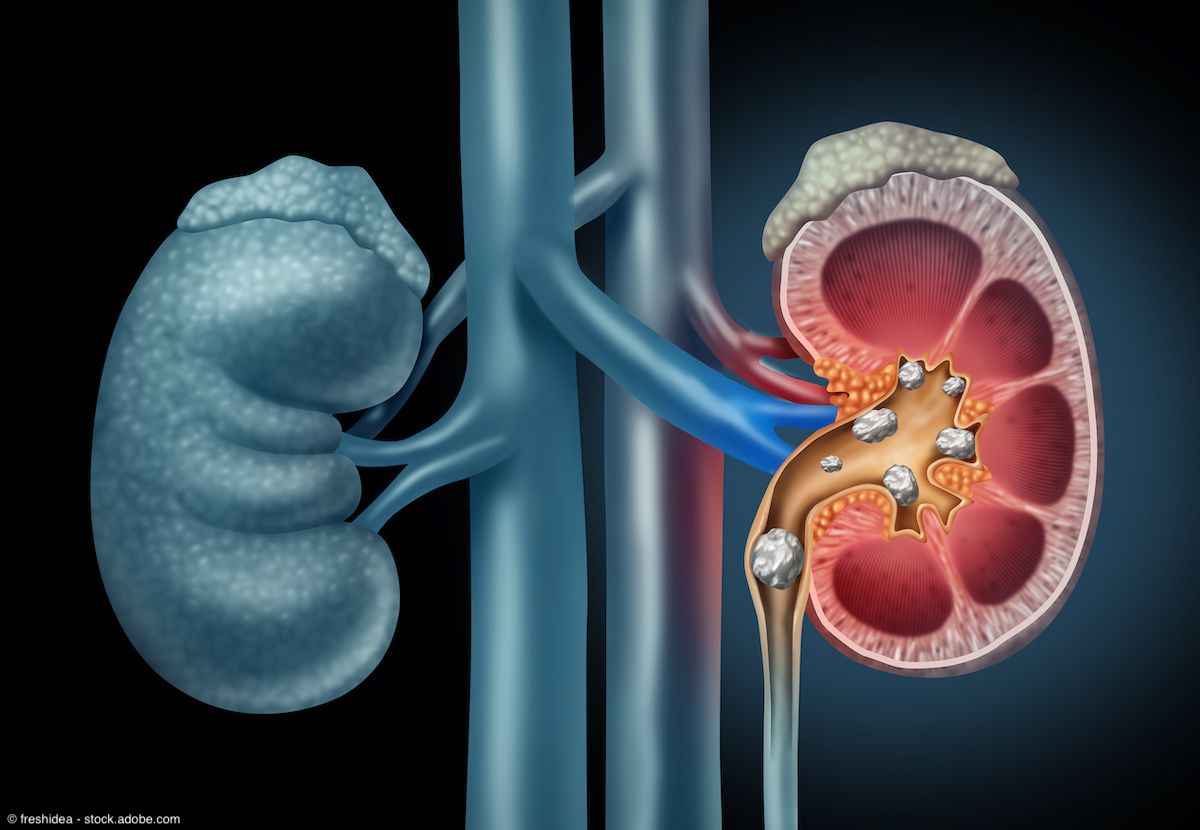Thiazide diuretics lower risk of kidney stones, genetic proxies show
“We found that these genetic proxies of thiazide diuretics were associated with a 15% lower risk of kidney stones,” says Jefferson Triozzi, MD.
A recent study conducted by investigators at Vanderbilt University Medical Center (VUMC) in Nashville, Tennessee supports the long-term efficacy of thiazide diuretics in kidney stone prevention, showing that genetic proxies of the drug were associated with a reduced risk of kidney stones.1,2
The VUMC team next plans to assess the mechanisms by which thiazide diuretics prevent kidney stone formation.

The genetic association study used a mendelian randomization analysis to determine the association between kidney stones and genetic proxies for thiazide diuretics over the course of a lifetime. According to the authors, “Genetic proxies of thiazide diuretics were genetic variants in the thiazide-sensitive sodium chloride cotransporter gene associated with systolic blood pressure.”1
Negative controls in the study were genetic proxies of β-blockers and systolic blood pressure.
Overall, data showed that genetic proxies of thiazide diuretics were associated with a lower odds of kidney stones (OR, 0.85; 95% CI, 0.81-0.89; P < .001). However, no association was seen between kidney stone formation and genetic proxies of β-blockers (OR, 1.02; 95% CI, 0.96-1.07; P = .52) or systolic blood pressure (OR, 1.00; 95% CI, 1.00-1.01; P = .49).
Further, the genetic proxies of thiazide diuretics were also associated with higher serum calcium (β [SE], 0.051 [0.0092]; P < .001) and total cholesterol (β [SE], 0.065 [0.015]; P < .001), as well as lower serum potassium (β [SE], −0.073 [0.022]; P < .001).
“We found that these genetic proxies of thiazide diuretics were associated with a 15% lower risk of kidney stones,” said lead author and VUMC nephrology fellow Jefferson Triozzi, MD, in a news release on the findings.2 “Furthermore, we examined serum laboratory values relevant to the treatment of kidney stones and found that the genetic proxies of thiazide diuretics were associated with higher serum calcium levels, supporting the notion that thiazides affect kidney stone risk by modulating calcium excretion in the urine.”
Overall, the study included 1,079,657 individuals, including 50,832 patients with kidney stones and 1,028,825 participants serving as controls. The majority of participants were male (92.6%), and the mean age was 64. Those who participated in the study were included from the Million Veteran Program (MVP), UK Biobank, and FinnGen study.
“The VA Million Veteran Program is the largest and most diverse biobank in the world, now with 1 million participants as of Nov. 11. Unique resources like the MVP, with extensive data on clinical condition combined with genomic data, provide a valuable resource for genetically informed drug discovery and drug repurposing. Thiazide diuretics are recommended by international guidelines for the prevention of calcium kidney stones with long-term safety data,” said senior author Adriana Hung, MD, MPH, in the news release.2 Hung is the medical director of dialysis services at the Nashville Veterans Association and the MVP local site principal investigator.
The VUMC team next plans to assess the mechanisms by which thiazide diuretics prevent kidney stone formation.
Triozzi concluded in the news release, “Our study highlights the importance of considering genetic proxies to estimate the long-term effects of medications and offers new evidence to support the use of thiazide diuretics for kidney stone prevention. We believe genetic data can help us understand drug mechanisms and perhaps lead to new drug discovery for kidney stone disease.”2
References
1. Triozzi JL, Hsi RS, Wang G, et al. Mendelian randomization analysis of genetic proxies of thiazide diuretics and the reduction of kidney stone risk. JAMA Netw Open. 2023;6(11):e2343290. doi:10.1001/jamanetworkopen.2023.43290
2. New study uses genetic data to support use of thiazide diuretics for kidney stone prevention. News release. Vanderbilt University Medical Center. December 4, 2023. Accessed December 11, 2023. https://news.vumc.org/2023/12/04/new-study-uses-genetic-data-to-support-use-of-thiazide-diuretics-for-kidney-stone-prevention/
Alkaline water unlikely to prevent kidney stones, study finds
January 11th 2024"While alkaline water products have a higher pH than regular water, they have a negligible alkali content–which suggests that they can't raise urine pH enough to affect the development of kidney and other urinary stones," says Roshan M. Patel, MD.
